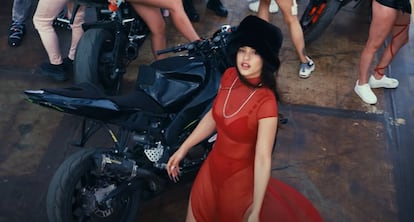Rosalía breaks new ground with ‘Saoko’
The Catalan singer has released the second single from her new album ‘Motomami.’ The song is more experimental than anything she has recorded before – and perhaps her best work yet

In the early hours of Friday morning Rosalía released the second single from her new album Motomami, which comes out on March 18. The first song to be released from the album was La Fama, an almost conventional bachata that dropped at the end of 2021. It was less digital and more dissonant than what was hoped for. On the track, Rosalía once again shares center stage with another artist – something that has become more common, since she completed her last album El Mal Querer – in this case, Canadian singer The Weeknd. But Saoko, papi, Saoko is something else…
In the song, Rosalía is once again flying solo and taking on whatever she wants. The track is more experimental than anything she has done to date, even stranger than A palé. And perhaps her best work yet. Lasting just two minutes, Saoko erupts over a classic reggaeton rhythm, but one that’s crowded and distorted, with the drones of a broken organ, a jazz piano interlude and a staggering finale that builds toward a fiery crescendo.
The song dabbles in Latin music, but is also a nod to the crazy experiment of Venezuelan musician Arca and Kayne West, who in 2013 released the album Yeezus, deciding that he was going to do something totally bizarre, industrial and psychotic and that it would sell as many records as the most conventional pop record. He almost did it. Rosalía has followed this idea, even making the same nods to Nine Inch Nails that were in West’s record, and mixing it with reggaeton. The result is banging.
Saoco is an African term that became popular in some Latin American countries and means rhythm, happiness, movement. It is also the name of the song that Daddy Yankee and Wisin released in 2014, artists the Catalan singer pays tribute to in the lyrics of the track. These lyrics should be less controversial than the four verses of Hentai that Rosalía sung from a chairlift, which triggered the indignation of many – not so much for their sexual overtones, surprisingly (the part about bowing as if before God to perform fellatio seemed to get missed) but rather for the use of Spanglish, millennial jargon, her observation that the world doesn’t stop moving and the indignation over why it continues to do so when others have decided to stop.
Saoko gets closer to the issue of personal affirmation, of the butterfly that transforms. To provide solace to those who miss Rosalía’s lyrical references to Homer, Saoko gifts us with a few mentions of Troy. And for those who are upset to see her move away from the hispanic music tradition, there are also references to Spanish sayings. These sit side-by-side with tributes to Kim Kardashian and Vivienne Westwood, and with an accent that when is spoken is hers, and when is sung points to something transatlantic, which is also hers.
In the music video to the song, Rosalía and a group of women ride motorbikes as if they were in The Fast and the Furious. Syncopated, edgy and full of memorable images, the video begins with a shot from the inside of a motorcycle gas tank and the Catalan singer filling it up. What doesn’t pollute, makes you stronger.
It’s very likely that, following this song, some will give up Rosalía as a lost cause. But it’s not her fault if someone at some point thought that we were seeing a new Niña Pastori. This is what happens when you are young in a world full of older people who think they are young. This is what happens when they don’t understand you and they blame you for not explaining yourself. This is what happens when you have to explain things to people who you are not even talking to. Rosalía has moved on. And it’s very likely that in some years time, she will come back, pick up a guitar and start playing bulerías. We can sit down and wait for her, with a kind of empty-nest syndrome because the kid has become a rebel, or we can go with her and enjoy the ride.
Tu suscripción se está usando en otro dispositivo
¿Quieres añadir otro usuario a tu suscripción?
Si continúas leyendo en este dispositivo, no se podrá leer en el otro.
FlechaTu suscripción se está usando en otro dispositivo y solo puedes acceder a EL PAÍS desde un dispositivo a la vez.
Si quieres compartir tu cuenta, cambia tu suscripción a la modalidad Premium, así podrás añadir otro usuario. Cada uno accederá con su propia cuenta de email, lo que os permitirá personalizar vuestra experiencia en EL PAÍS.
¿Tienes una suscripción de empresa? Accede aquí para contratar más cuentas.
En el caso de no saber quién está usando tu cuenta, te recomendamos cambiar tu contraseña aquí.
Si decides continuar compartiendo tu cuenta, este mensaje se mostrará en tu dispositivo y en el de la otra persona que está usando tu cuenta de forma indefinida, afectando a tu experiencia de lectura. Puedes consultar aquí los términos y condiciones de la suscripción digital.









































